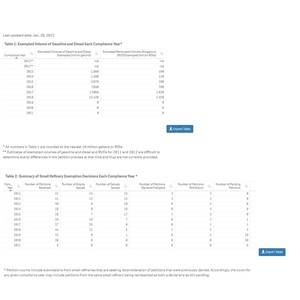Biofuel groups urge EPA to follow through with plans to deny SREs




February 7, 2022
BY Erin Krueger
Representatives of the biofuels industry urged the U.S. EPA to follow through with its proposal to deny more than 60 pending small refinery exemption (SRE) petitions in comments filed with the agency before the close of the Feb. 7 public comment deadline.
In the proposal, first released on Dec. 7, the EPA announced plans to deny more than 60 pending SREs from small refineries seeking exemptions from the Renewable Fuel Standard program for one or more compliance years between 2016 and 2021. The agency said the proposed decision results from its review of the pending SRE petitions and supporting information, its legal, technical and policy analysis of the Clean Air Act provisions related to small refineries, and its application of the holding of the U.S. Court of Appeals for the Tenth Circuit in Renewable Fuels Association et al. v. EPA.
A total of 69 SRE petitions are currently pending, with five SRE petitions pending for compliance year 2021, 30 SRE petitions pending for compliance year 2020, 29 SRE petitions pending for compliance year 2019, three SRE petitions pending for compliance year 2018, one SRE petition pending for compliance year 2017, and one SRE petition pending for compliance year 2016.
The Renewable Fuels Association on Feb. 7 expressed strong support for the agency’s proposed action, noting it would restore confidence in the RFS and ensure that SRE program complies with the Tenth Circuit Court’s 2020 decision moving forward.
“EPA’s proposed decision is consistent with the statute and with EPA’s repeated determinations that small refineries pass through the cost of RFS compliance to the wholesale prices of their products and therefore do not face disproportionate economic hardship,” wrote Geoff Cooper, president and CEO of the RFA in comments submitted to the agency. “When finalized, the proposed approach will restore confidence in the RFS program, which in turn will stimulate the increased investment in renewable fuel production that Congress sought to encourage.”
Advertisement
RFA also encourages EPA to deny 31 SREs granted by the previous administration for compliance year 2018. Those exemptions were inappropriately issued in 2019 and were recently remanded to EPA by the D.C. Circuit following a legal challenge led by RFA.
Cooper noted that the congressional goals of enhanced energy security and greenhouse gas emissions reduction have been undermined over the past several years due to the massive increase in SREs. “America’s biofuel producers and farmers have been forced to pay the price—the uncertainty and market instability caused by the surge of exemptions have left them unable to fully benefit from a program intended to increase demand for their products,” he wrote.
The American Coalition for Ethanol is also speaking out in support of EPA’s SRE proposal in comments submitted to the agency. “ACE strongly supports EPA’s proposed decision to deny all pending SRE petitions by finding the petitioning refineries do not face disproportionate economic hardship (DEH) caused by compliance with their RFS obligations,” wrote Brian Jennings, CEO of ACE.
ACE’s comments provide background on the litigation that compels EPA to deny the pending SREs, including precedent established by the Tenth Circuit Court in HollyFrontier v. Renewable Fuels Association, which ACE was a petitioner on, and subsequent decision by the Supreme Court in HollyFrontier Cheyenne Refining, LLC v. RFA. EPA’s proposed denial of all pending SRE petitions complies with the Tenth Circuit Court ruling in that: 1) The cause of refinery “hardship” must be the RFS, rather than general economic factors; and 2) EPA’s determination that RFS compliance costs are essentially a pass through that are not ultimately born by refiners prevents RIN prices from being used to justify waivers.
ACE is also encouraged EPA proposed to evaluate future SRE petitions based on these two restraints.
Clean Fuels Alliance America also supports the EPA’s SRE proposal. “Clean Fuels supports EPA’s proposal to deny 65 pending small-refinery exemption petitions and requests that EPA also deny the 36 small-refinery exemptions—31 of which were originally granted—for 2018,” wrote Kurt Kovarik, vice president of federal affairs at Clean Fuels. The 36 additional petitions pending before the agency are those remanded by order of the U.S. Court of Appeals for the D.C. Circuit in response to EPA’s motion in Sinclair Wyoming Refinery and consolidated cases.
Advertisement
Clean Fuels estimates that the 2018 exemptions reduced demand for biodiesel and renewable diesel by 190 million gallons. Overall, the exemptions that EPA granted beginning in 2017 impacted 550 million gallons of biomass-based diesel, resulting in 5.2 million metric tons of additional greenhouse gas emissions. “If EPA were to grant the pending 2019 small refinery exemptions, we estimate that biodiesel and renewable diesel will experience a future market loss of approximately 200 million gallons, resulting in 1.9 million MT of GHG emissions in the atmosphere that could have otherwise been avoided,” Kovarik continued.
“EPA’s denial of pending small refinery exemptions is not just appropriate, but required,” Kovarik added. “Clean Fuels and its members appreciate the administration’s commitment to getting the RFS back on track. We urge EPA to finalize the volumes quickly, account for small refinery exemptions fairly, and grow the market for biofuels through a timely rule for 2023 and beyond.”
Upcoming Events





